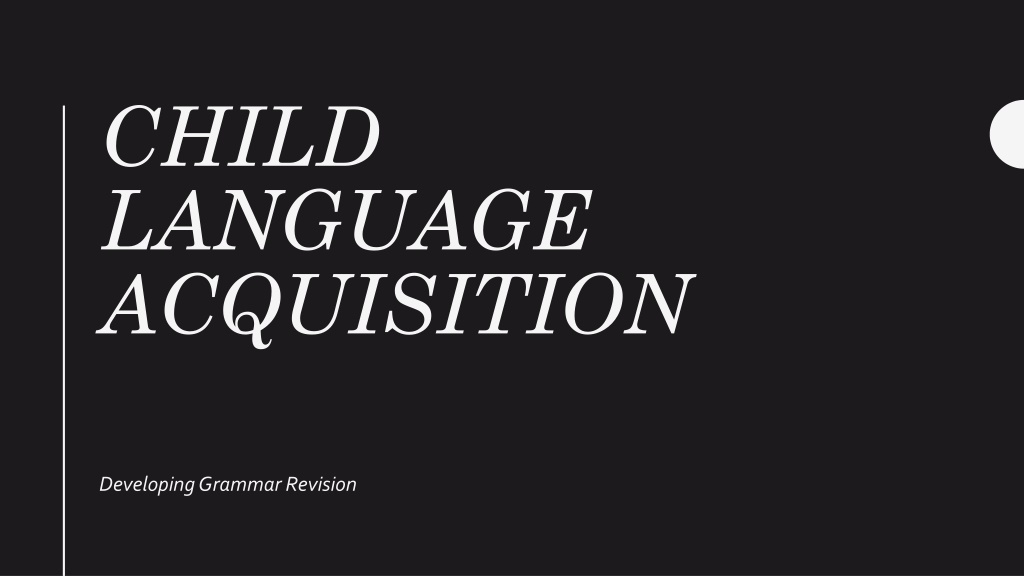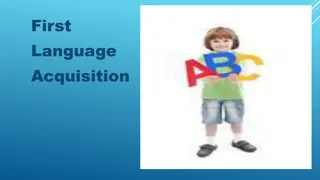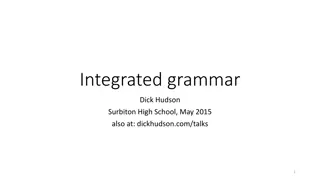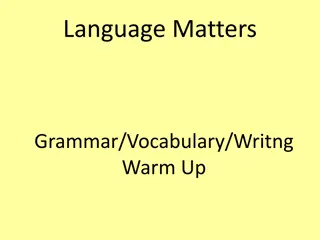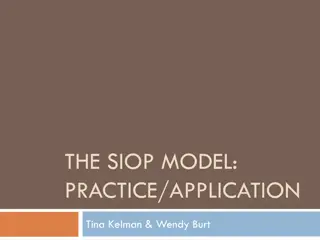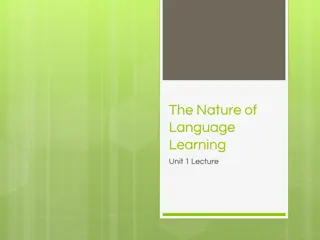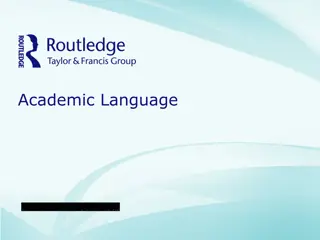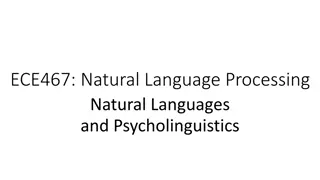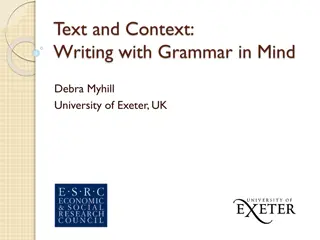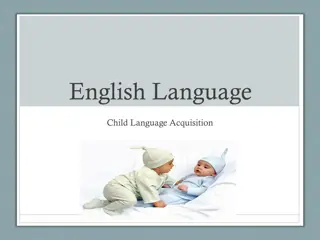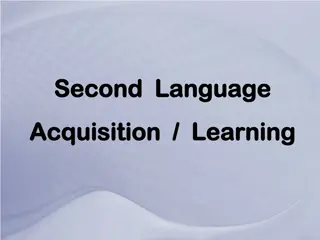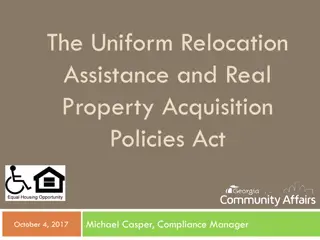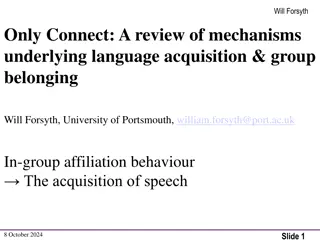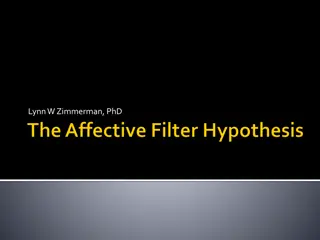Understanding Child Language Acquisition: Grammar Development Insights
Explore the intricacies of child language acquisition focusing on grammar development. Delve into concepts like bound morphemes, free morphemes, inflectional morphology, derivational morphology, word classes, and Roger Brown's meaning relations. Gain insights into lexical and grammatical stages of development, including one-word, two-word, telegraphic, and post-telegraphic stages.
Uploaded on Sep 26, 2024 | 1 Views
Download Presentation

Please find below an Image/Link to download the presentation.
The content on the website is provided AS IS for your information and personal use only. It may not be sold, licensed, or shared on other websites without obtaining consent from the author. Download presentation by click this link. If you encounter any issues during the download, it is possible that the publisher has removed the file from their server.
E N D
Presentation Transcript
CHILD LANGUAGE ACQUISITION Developing Grammar Revision
Starter: Tables What s the difference between a bound morpheme and a free morpheme? Will s How can we break these words down into units of meaning? Playing Jumped Unpleasant What s the difference between inflectional morphology and derivational morphology? Lifeless Disinterested Redevelopment Industrialisation
Word Class Revision What word classes can you remember from AS?
Storytime You will be given a word class to quickly write down bearing in mind this is only one word. You then need to fold your paper over and pass it on. Verbal practice: Noun: Concrete, Abstract, Proper Determiner: Indefinite/Definite Article, Possessive, Quantity Adjective: Gradable (Comparative, Superlative), Non- gradable Adverb: Manner, Place, Time, Degree, Frequency Preposition Conjunction: Subordinating, Coordinating Pronoun: Subject, Object, Possessive, Reflexive, Demonstrative, Relative Main Verb: Dynamic, Stative, Transitive, Intransitive, Material, Mental, Relational, Non-Finite, Finite Auxiliary Verb: Tense, Modal
Roger Brown s meaning relations: Agent + action (someone performing an action e.g. Daddy kick) Agent + affected (someone doing something to an object e.g. Me ball) Entity + attribute (a person/object described e.g. Kitty big) Action + affected (an action affecting an object e.g. Throw stick) Action + location (action occurring in a certain place e.g. Sit chair) Entity + location (object located e.g. Spoon table) Possessor + possession (object having a possessor e.g. Daddy coat) Nomination (person/object is labelled e.g. That cake) Recurrence (an event repeated e.g. More ball) Negation (something denied e.g. No ball)
Lexical and Grammatical Stages of Development 1) Holophrastic/one-word stage: What s the difference? 2) Two-word stage: Roger Brown s meaning relations 3) Telegraphic stage: Interrogative pronoun development; stages of negative formation (Bellugi); stages of pronoun development (Bellugi) 4) Post-telegraphic stage: stages of morphological development (Brown); virtuous errors and overgeneralisations In 4 groups, outline the following stages: 1) Negative formation 2) Pronoun development 3) Morphological development 4) Virtuous errors and overgeneralisations
Stages of Negative Formation (Bellugi) Stage Child Example 1 Uses no or not at the beginning or end of a sentence No wear shoes 2 Moves no/not inside the sentence I no want it 3 Attaches the negative to auxiliary verbs and the copula verb be securely I don t want to go to nursery I am not
Stages of Pronoun Development (Bellugi) Stage Child Example 1 Child uses their own name Tom play 2 Child recognises the I/me pronouns and that these are used in different places within a sentence I play toy Me do that 3 Child uses them according to whether they are in the subject or object position within a sentence Give it to me I want that
Term Example Present tense progressive -ing Stages of Prepositions In, on Plural -s Morphological Development (Brown) Past tense irregular Run/ran Possessive s Uncontractible copula Is/was Articles The/a Past tense regular -ed Third person regular Runs Third person irregular Has Uncontractible auxiliary verb They were running Contractible copula She s Contractible auxiliary She s running
Virtuous errors vs. overgeneralisations Virtuous errors: syntactic errors made by young children in which the non-standard utterance reveals some understanding, though incomplete, of standard syntax e.g. I runned instead of I ran Overgeneralisations: a learner s extension of a word or meaning or grammatical rule beyond its normal use e.g. House > houses, mouse > mouses
Developing Grammar 1) What are the 4 stages of children s grammatical development? Provide descriptors and ages (months). (12) 2) What is the difference between inflectional and derivational morphology? Provide examples. (4) Test 3) What is the difference between a holophrase and one-word utterance? Provide examples. (4) 4) What are the 10 different types of Roger Brown s meaning relations? Provide examples for each. (20) 5) Which interrogative pronouns develop first? (2) 6) What are Ursula Bellugi s 3 stages of negative formation? Provide descriptors and examples. (9) 7) What are Ursula Bellugi s 3 stages of pronoun development? Provide descriptors and examples. (9) 8) What are the 13 stages of Roger Brown s morpheme acquisition? Provide examples. (26) 9) What are the differences between virtuous errors and overgeneralisations? Provide examples. (4)
